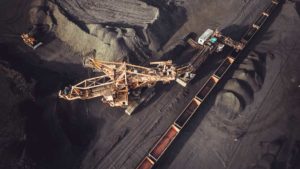Australians want a tax on fossil fuel exports that can pay for the costs created by climate change, with a new survey finding that roughly 50 per cent of respondents support the introduction of a $1 per tonne or more charge.
The federal government’s sixth intergenerational report put the annual bill for the impacts of climate change at $3.4 billion to $10.5 billion a year for the next 40 years, and insurers are already counting the costs of now-regular ‘once in a hundred year’ disasters.
A $1/tonne levy would generate $1.5 billion annually.
The Australia Institute survey asked 508 people across the political spectrum whether they’d support a $1/tonne tax and 509 people whether they’d support a $20/tonne tax.
A little over half of each group supported both options, whereas one-fifth of people polled opposed them.
“The message from the Australian people is pretty clear: just get it done,” said The Australia Institute executive director Dr Richard Denniss.
“A majority of Australians back a tax on the fossil fuel industry, regardless of its size. The rest is detail. The public are clearly frustrated with the lack of tax paid by the industry.
“There is support for a tax on fossil fuel producers and their massive profits, in return for the significant damage they cause to our climate – costs that come back to taxpayers through natural disasters and higher insurance premiums.
“Stage 3 has shown us that the Australian people are up for an honest conversation about tax, so let’s get on with it.”
Bring back the carbon tax
During today’s National Press Club address, economist Ross Garnaut and foreigner ACCC head Rod Sims went even further by calling for a revival of a carbon tax that also includes scope 3 emissions, changes to the 32 gigawatt (GW) Capacity Investment Scheme, and a full review of electricity infrastructure ownership.
They argued for a “carbon solutions levy” on fossil fuel production set at $90/tonne, the same level as Europe’s five-year average, which they say would reap $100 billion a year if brought in from 2030.
Garnaut says this won’t create a sovereign risk for investment, given levies or constraints on carbon dioxide emissions have been expected for 23 years.
“Anyone who does not anticipate what is good or necessary policy coming in at some time hasn’t absorbed any of the reality around them.” he said today.
“In the end political judgments will have to be made about whether restoration of rising income standards.
“Productivity growth and prosperity for the Australian people are more important than preserving the profitability of the oil and gas companies.”
Garnaut called for changes to the Capacity Investment Scheme, which will support energy storage projects, should nix reserve auctions and open the program to private investors as well, to avoid distorting the market with government funding. They also suggest funding 80 per cent of a project and requiring repayments once they turn cash flow positive.
Garnaut’s final recommendation is a Productivity Commission review of monopolistic electricity infrastructure to look at how to encourage and involve consumer energy resources and restructure transmission so it can deliver on the country’s energy superpower potential.
Sims says while the idea may be rejected as ridiculous today, it’s worth starting to promote concepts like these now.
“Basic economics means you must price the damage that fossil carbon imposes on us all,” Sims said today.
“Not to do so is to make it essentially impossible for green products to compete with currently cheaper fossil fuel products.”








